The use, in Nepal, of nepotism and its sister—“source-force”—to get ahead in life, among a myriad of other reasons Nepalis use them for, is as part of the fabric of Nepalese culture as kissing ass (chakari or chaplusi garnu) is.
Is it any wonder then that Nepali UWC-scholarship aspirants, as young as they are and as products of this culture as they are, also try to see if they can get an edge over the others—or even win a scholarship—that way?! They may have heard stories of others in the past benefiting from doing so. You can’t blame them for believing that their contemporaries must be attempting to do the same, and therefore that they should also try to do the same. How could they be expected to know, or believe, any better when all that is just part of the culture?!
There have been times when attempts have been made to involve me in it as well.
But before that, a bit about my involvement with Nepal UWC Selection Committee.
Since graduating from UWCAD, I have volunteered for the Committee when I have been able. The first time was from the Summer of 1997 to the Winter of 1998-99 when I had returned to the country for a longish stay. The second time was in 2000, when I was home for about ten months (following a year in Australia, getting my teaching qualification).
By the mid-nineties, I had come to believe, firstly, that UWC scholarships should be available to students from other schools apart from St. Xavier’s and St. Mary’s.
Secondly, that the scholarships should be available to considerably more students from low socio-economic backgrounds similar to myself.
To that end, during those times, on my own accord, I did outreach work, visiting other schools and publicizing and promoting UWC scholarships. When doing so, I would invariably share my personal story to try to inspire children from socio-economic backgrounds similar to mine to apply.
I was also part of the team that, in 1998, revamped the National Committee to its current structure and form.
To introduce and publicize the UWC movement, and to promote the opportunities available at UWC’s, we even produced a pamphlet (see image at the top).
One of the reasons for the revamping had been to enable the Selection Committee to select students entirely on the basis of merit, instead of on their parents’ bank balance. Should the best candidate(s) lack the necessary financial resources, the National Committee was supposed to raise funds to cover the balance. (See bottom left of the pamphlet.) That was then!
Since returning to Nepal this time around—in May 2013—I have been heavily involved in outreach work as well as in the selection of UWC scholars once again, picking up where I had left off more than a decade ago. I have been writing and speaking a lot—in Nepal and abroad—about UWC scholarships as well as the impact UWC experiences have had on me, reaching a wider audience than during the late nineties. I have also raised funds for UWC scholars.
So, naturally, people — (perspective) applicants, parents and others — have approached me with requests for help and even to intercede on their behalf.
Schools have asked me to visit and speak to their students. Parents and others have requested that I speak to their ward or to communicate with them about the scholarships and/or to actually aid them with preparation for the selection process—by going over how best to prepare for the application and selection, the kind of questions we, the interviewers, ask and the expected answers etc. Students and applicants have also made similar requests.
I have more than happily obliged—and will continue to do so—when schools and individuals have requested me to speak to their students. (The requests, however, have not been that high and frequent, surprisingly, even though I have done everything I can to advertise my willingness to do so, both on social media and through my contacts.)
But I have stayed away from giving specific advice and instructions, or from providing “inside information” as it were, for obvious reasons! When I have received such requests, I have generally responded thus:
“Since I am a member of the selection committee, I cannot advise you on how to best prepare for it. To do so would be to create conflict of interest on my part. I know in Nepal conflict of interest is NOT an issue most take seriously, but I do. Advising you but not others would give you an unfair advantage over others. I’m sorry.”
Far from assisting them, even when I have felt that an applicant is, in some way, however loosely, connected to me, I (and others in the Selection Committee) have even opted out of evaluating their application or interviewing them.
When I have received requests for interceding on their behalf in the selection process, I have also responded in a similar way as you can see below.
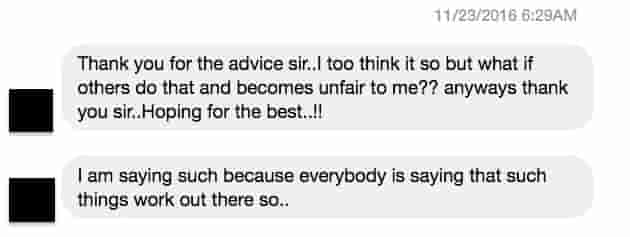
The reasons for that stance of mine are simple and straight-forward!
The particular and pervasive brand of nepotism practiced in Nepal and the use of “source-force” I view as a real social ill in general. They devalue and undercut merit and, instead, promote mediocrity, and thus hinder social, economic and political progress.
Some of the practices of nepotism and the use of “source-force” is completely unethical of course but in the context of Nepal…what is ethics?! That, however, is NOT to say that ALL instances of nepotism and use of “source-force” in the country are unethical, nor that ALL Nepalis—or even a majority of Nepalis—are unethical. I am NOT saying that of course!
Regardless, I am loath to perpetuate the practice!
So, if as a potential applicant or as someone related to a potential applicant, or as an applicant who has progressed to the second or third stage of the selection process, you contact me for assistance, I am sorry to tell you that I will be of little help!
Besides, though I might feel a little flattered that you think I have so much clout in the Selection Committee, I don’t.
Having said that, I am not naïve and so am also aware that, because of my beliefs and views about nepotism and “source-force,” I will struggle to get ahead in Nepal. Not subscribing to this particular aspect of our culture and unwilling to practice the very peculiar but essential skill of kissing ass means that I can pretty much kiss good-bye to my personal “advancement,” for instance!
I am also aware that there are those who think I am arrogant holding such views and opinions about nepotism and “source-force” because, they, including St. Xaver’s School friends, tell me, “You think you know better?! You don’t. That’s just how things work here in Nepal and nothing you do or say can change any of that.” Of course, I am completely aware of the fact that I wield very little power and that my thinking the way I do and acting accordingly can’t and won’t change anything really in the short term, certainly not in my life time.
As far as I am concerned though, I am not being arrogant; I am just being who I am and what I want to be: the change! After all, I did return to Nepal to change.
Feb. 10, 2019 Update
I can now add a teacher as one who thought that our UWC selection process is not only as corrupt as all other processes and systems in the country, but ALSO that I may be as corrupt. (Don’t worry I wasn’t offended!) She seems to believe that I selected the student from her school in 2017 for a UWC scholarship (you can read about him here), and, therefore, that had I been involved in the selection this past year also, I would have again, “perhaps,” selected one of her students!
Of course, nothing could be further from the truth which I tried to convey to her in my response. However, I wonder how much what I said actually got through to her. I do wonder, not because she is stupid or unwise or because of any such reason (I don’t personally know her and I know very little about her), but rather because of the way our society works and functions is so utterly and completely corrupt.
Let me explain. I suspect that when a Nepali come across a fellow Nepali not corrupted by our society, they have a hard time believing that person. Based on my six years or so of living and working in the country, I would say that “Why would you not be corrupt and take advantage of the system when everyone is?!” is something most Nepalis probably have a hard time wrapping their head around! Of course, I could be totally wrong!
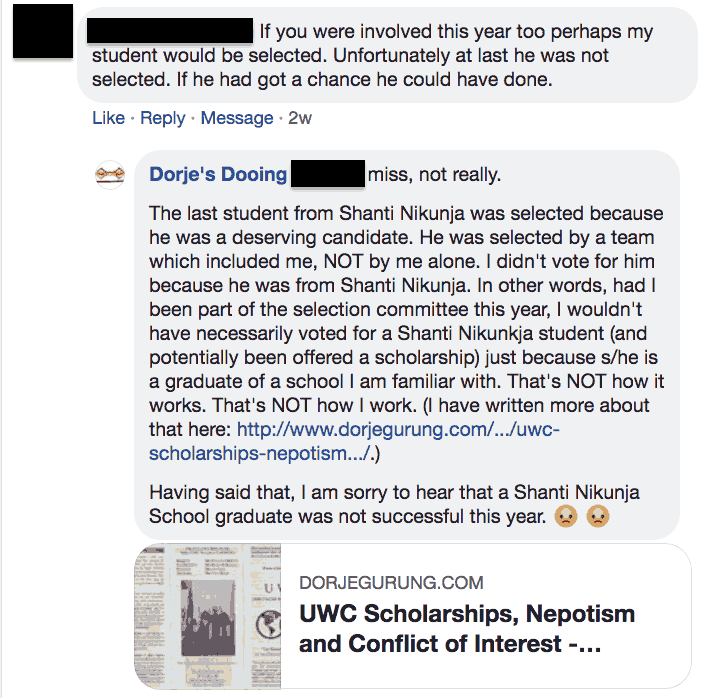
* * * * * * * *
References
- Shakya, S. Uleashing Nepal. On pages 28-29, in “The Institution of Chakari,” Shakya details how and why the Rana rulers instituted the practice.
The practice obviously did not stop with the end of their rule in 1951. The Shah royals, who ruled the country until 1990, perpetuated the practice, as have the democratically elected official since 1990. Over time, it also evolved and is not just part of the political culture but very much a part of the culture in general. - Gellner, D. N. & Snellinger, A. Source Force. This concise write-up on the subject is excellent! [Added on July 2, after the publication of the blog post, as I came across it only then.]
- Click here for the image of an exchange I had, in 2015, with a UWC Scholarship candidate, following the conclusion of 2016-scholars selection. In the selection, the candidate had come out towards the top but the family didn’t have enough financial resources to send them to any of UWC options available. He contacted me requesting my help in securing financial assistance from the Nepal UWC National Committee. Incidentally, I don’t personally know the candidate. [Added on July 18.]
- Click here for another image of an exchange I had, in 2016, during the selection of 2017 scholars. The candidate had made it through to the second round and wanted help from me to prepare for the interviews. Of course, I told him I couldn’t. [Added on August 7.]
- Recently, a single Supreme Court bench of justice, Gopal Parajuli, recently heard a contempt of court case against journalists and editors of a Media House. The charges had been brought over a series of articles in one of the dailies of the Media House about discrepancies in the date of birth of…The Chief Justice Gopal Parajuli!! Conflict of interest anyone?!?!? As if that wasn’t enough, the justice ordered Press Council of Nepal (PCN) “to investigate if the news violated journalists’ code of conduct and to ensure that no news criticising the Chief Justice is published again.” [Added on March 7, 2018]

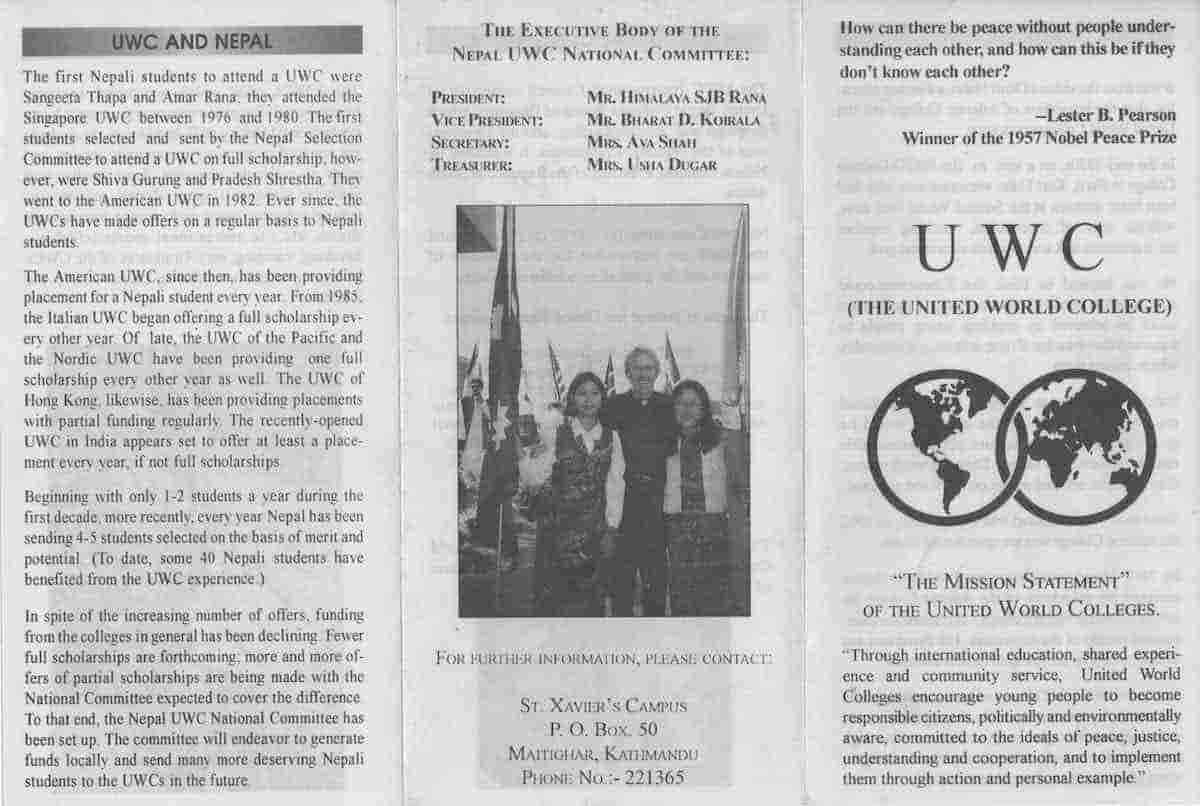
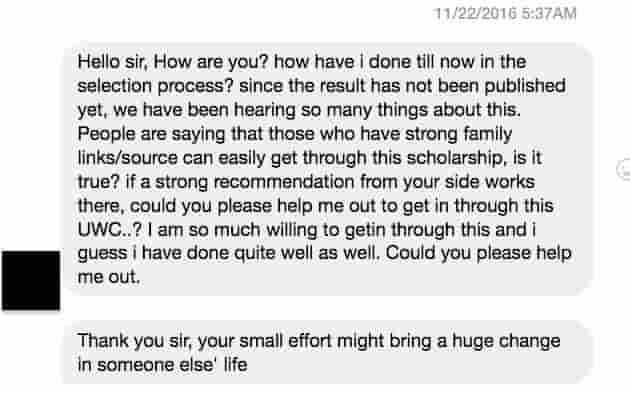
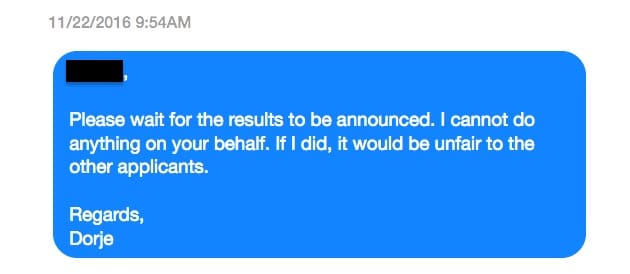
Sir you really do inspire me.
Hello its amazing
Hello sir!
This is for Mr. Gurung. I also believe that Nepal has alot of nepotism involved in its decisions. I have heard my friend talk about using of source-force to get in to UWC . They often comment applying to UWC as a waste of money. Is it so? I know we cannot depend on what others say. But believe me sir, if we are to check the pattern for those who get into UWC we can always track involvement of source as their parents reside in higher authority of government. So , this simply means that me as a student from low income background and a son of a shookeeper never will have a chance to go anywhere irrespective of just UWC…AREN’T WE MEANT FOR UWC TOO???
Respected Sir,
As the official website of UWC Nepal (www.uwcnepal.org.np) has crashed, I could not refer the form distribution date for this year. It would be my pleasure if you could inform me about this topic.
Thanking you in anticipation!
Dear Pratik,
The UWC Nepal website has NOT crashed; it’s being revamped.
I don’t decide on when they’ll be made available, so I can’t tell you. But, since you subscribe to my blog, you’ll receive notification about the blog post I’ll write when it is. Keep an eye out for the blog post is what I can suggest!